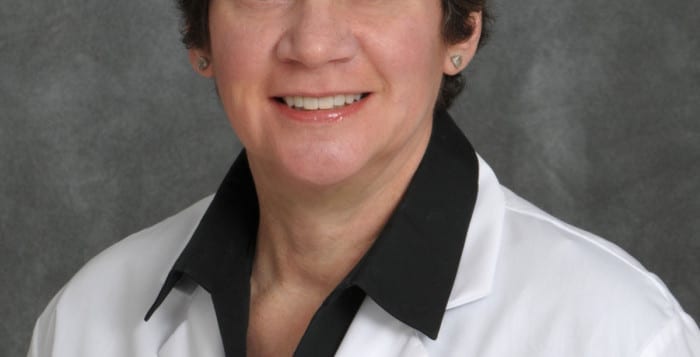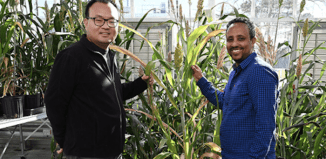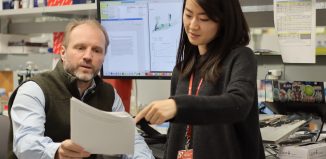SBU’s Stopeck: A determined ally in breast cancer battle
Birthdays, anniversaries, weddings and vacations are all important to her. She’s not talking about her own — she wants her patients, some of whom are locked in a battle with cancer, to make it to these landmark events.
Dr. Alison Stopeck, a professor of medicine and the chief of the Division of Hematology/Oncology at Stony Brook University, treats a wide range of people with breast cancer, from those who don’t have cancer but are at high risk of developing it in the future to women and men with all stages of breast cancer diagnosis.
Stopeck said her approach is to treat the whole patient, because she recognizes that combatting cancer most effectively requires care for the physical, emotional and spiritual needs of her patients. Finding out what is important to a patient is “vital to developing the most impactful treatment plan.”
Around Thanksgiving and Christmas, she asks them about their holiday planning and tries to treat her patients around those plans so they can “live as normally as possible” while still receiving breast cancer treatment.
“I do like treating people with metastatic disease,” said Stopeck, who joined Stony Brook last September after a 20-year career at the University of Arizona Cancer Center. “If they come in with metastatic cancer, you can see [tumors] shrink.”
She can also tell patients they are in remission, that the Stony Brook Cancer Center is offering a clinical trial that may be more effective for them, or that there is a new therapy that might work for their particular cancer.
She sees patients with metastatic cancer more frequently because they receive treatment that Stopeck follows closely, so she “gets to know them and their families better,” she said. “It is an honor to develop deep relationships with my patients and their families.”
Dr. Yusuf Hannun, the director of the Cancer Center and Stopeck’s supervisor, praised Stopeck’s passion for her work.
“She is the model that we want to emulate in the development of our Cancer Center,” Hannun said. When Hannun hired Stopeck last year, he had high expectations and he said “she exceeded” those.
Stopeck said doctors can optimize therapy and side effects at the same time. When her patients qualify, Stopeck asks them to go on clinical trials to improve an understanding of the disease. She sometimes also asks for tissue, blood and urine samples so she can ask more questions about the disease and its progression.
While she’s spent years treating patients, she also conducts research.
Stopeck looks at predictive biomarkers, which may help in selecting the best therapy for a patient, while also offering her an early indication of how a treatment is going, so she can stop it if it’s not working.
She is also looking to bring patients into clinical trials.
At Stony Brook, she said, researchers are working on discovering a wide range of breast cancer challenges, including improving treatment for patients with triple negative, which is the most deadly and aggressive form. Studies are also exploring ways to reduce toxicities, including bone pains, of aromatase inhibitors while giving less chemotherapy to patients who don’t need it.
Hannun said the Cancer Center considers clinical trials as “state of the art practice as this is what pushes the envelope and allows patients to be ahead of the curve in their clinical care,” he said.
As a doctor, Stopeck wants her patients to help make informed decisions about their treatment. “Most people think they want to live to 100, but they don’t want to live to 100 when it feels like 1,000,” she said.
Stopeck described how vaccinations for pneumonia have reduced the numbers of deaths from a disease that used to be the leading cause of death in 1900. She wants to figure out how to prevent a person from going through the pain and trauma of breast cancer.
She also explores how some lifestyle decisions can help. At the moment, there is epidemiological data on the benefits of cruciferous vegetables, but no proven research to support their role in preventing breast cancer, she said, which is why she’s studying it. Eating a low-fat diet, high in vegetables along with consistent exercise and a healthy body weight are the best advice researchers have on decreasing breast cancer recurrences.
As for Breast Cancer Awareness Month, in October, she said the funds raised for research can help the scientific efforts. She used a $30,000 grant to develop an imaging protocol to measure breast density safely, easily and comfortably in women. She has used this technology to obtain larger grants from the National Cancer Institute and the National Institutes of Health. For every dollar of private donations invested, an additional $25 in funding can be obtained through the NIH, she said.
Stopeck grew up in Plainview in the same house where her parents still live. She moved to Farmingville from Arizona last September. She loves animals and enjoys traveling. The fact that her parents and sister live nearby make her feel as if she’s “coming back home.”
In her research and clinical practice, she has an ambitious and unambiguous focus. “My goal is simple: treat, cure and prevent breast cancer,” she said. “I live it and breathe it every day.”







